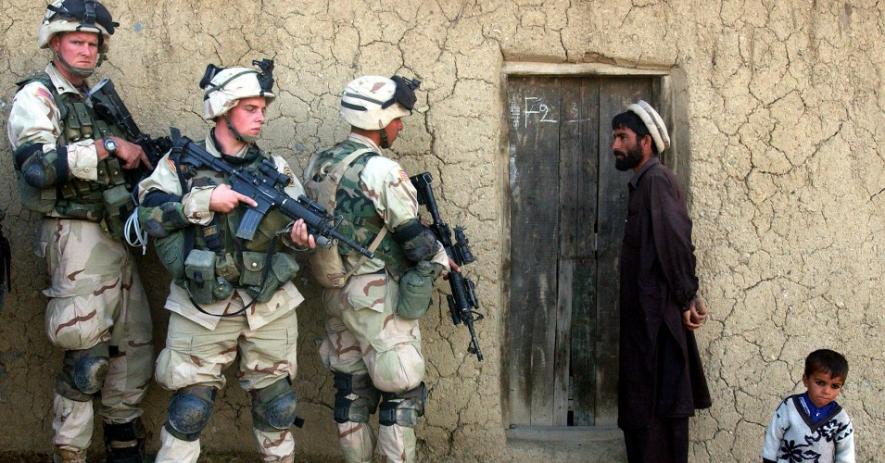Afghanistan: Short-term Gain Versus Long-term Pain

Image for representational use only.Image Courtesy : Commons Dream
The announcement on September 8 by US President Donald Trump calling off negotiations - indeed declaring it “dead” - with the Taliban has provided an opportunity for India to be included in the Afghan peace process from which it has been keeping away. But this opportunity comes with caveats.
Officially, the US administration blamed the Taliban for carrying out an attack just when an agreement was to be announced. Trump was said to be outraged by a suicide attack by the Taliban in Kabul the day before, in which 12 Afghans and one US soldier died. However, US Secretary of State Mike Pompeo clarified on September 8 that in “just last 10 days alone, (US forces) killed over a thousand Taliban”. So, while talks were going on, both sides had continued to attack each other. Therefore, it appears more likely that it was the refusal by the Taliban to meet the Afghan government at Camp David which put paid to the formal announcement of a deal. This refusal seems to have stolen the big moment President Trump was hoping to stage at Camp David.
As a result, there is renewed fear of a prolonged war. Some sections believe that the developments are a boost to the Afghan government and its forces which had been sidelined from the process on the Taliban’s insistence. There is also the view that the breakdown of talks is temporary and is bound to resume because the US does not have the stomach to suffer further losses. But if the war persists and the Taliban and the Kabul regime carry on fighting, then it’s the Al Qaeda and ISIS forces which stand to gain the most.
From outcast to a legitimate force
The Taliban, which was hunted after 2001 for hosting Al-Qaeda — which carried out the attack on the World Trade Centre — has emerged as the main party to negotiate with for the US, which seeks to pull out its troops. A conservative and deeply patriarchal movement, which would turn women into second-class citizens, and is responsible for unleashing so much horror, was able to become a legitimate part of the process. Their political ideology is reactionary, but it’s their armed militancy that has propelled them to this status. So much so that the US refused to even listen to its protege, the Kabul government, and sidelined it under pressure from the Taliban. The Taliban had insisted on reaching an agreement on US-led foreign troops leaving the country before they would talk to the Kabul government.
However, there are signs of differences within the Taliban ranks. For instance, when Pakistan tried to suggest that the Afghan peace process would become more difficult because of India’s move to abrogate Article 370, some Taliban leaders were quick to insist that there is no link between the two. This underlines the fact that the Taliban’s ambitions are confined to their country — unlike Al Qaeda and ISIS which are crusading militia (ironically spawned by US government agencies) carrying out attacks in the name of the Muslim Ummah. The desire to end the war runs high among Taliban ranks, possibly because three generations since 1978 have grown up fighting.
The fact that the Taliban was also negotiating with Afghanistan’s neighbours — the Central Asian Republics, China and Russia — apart from the US, lends weight to their key role in any Afghan future. Thus, while Pakistan dominates the peace process, it would be a mistake to treat the Taliban as its patsy.
Therefore, notwithstanding its reactionary and misogynistic politics, the Taliban has militarily reached a point where there can be no solution without them on board. It is true that the Taliban also seeks to establish Pashtun majoritarianism. Nevertheless, their ambition is limited to their own country because of their nationalist perspective.
While the Taliban’s strength lies in its military power, they are weakened by their isolation from other ethnic communities in Afghanistan and insistence on restoring their version of Sharia law.
Interestingly, even the Kabul government has not been able to discard or replace the Sharia law. The assurances made by successive governments in the aftermath of the 2001 war — guaranteeing equal rights for women, investments in social sector, and development — have not materialised. In fact, the situation has turned worse for women. The rampant corruption and brutal suppression of dissent by the government has not helped its case.
Thus, as and when talks begin — and the chances of this are quite high despite Trump’s statements — neither the Taliban nor the Kabul government actually inspire confidence, as far as the people of the country are concerned. Yet, the two parties have to engage in talks lest the conflict drags on and becomes a proxy war backed and funded by external and regional powers. Such a situation would be disastrous as amid the war between the Taliban and the Kabul regime, ISIS and Al Qaeda, with their few thousand soldiers, will be able to expand and consolidate their strongholds.
India has to proceed very carefully on this issue, especially considering Trump’s record. The US President — after getting most countries to abide by his unilateral sanctions against Iran — is on the verge of meeting President Rouhani of Iran on the sidelines of the UN General Assembly session. India was blindsided and cut most of its links with Iran. It lost its source of high-quality oil at discounted rates and also turned lukewarm on the Chabahar port. It now has to hurriedly reach out to Iran.
Similarly, Trump spoke at the G7 meeting about how India and Pakistan are not doing enough on Afghanistan and must share the burden of the war. Now, there is apprehension that India might allow itself to get involved in the Afghan war, in the name of standing by the Kabul government. It is the Indian establishment’s understanding that the Taliban is the cat’s paw of Pakistan and therefore should be shunned. However, a better course would be to reach out to all sides, including the Taliban, despite the bitter memories of the IC 814 hijack of December 24,1999. If bringing the war to an end, as well as rebuilding Afghanistan, is the objective, India cannot remain the only country to not reach out to the Taliban. Thus, India lending its weight to pushing the Taliban and the Kabul government to engage in talks is the way forward.
Instead of celebrating the breakdown of talks between the US and the Taliban, it might be worth India’s while to realise the graver regional implications of the Afghan war getting prolonged. This is especially true in the case of Kashmir, now that the Indian government has decided to reduce the only Muslim majority semi-autonomous state in India to a virtual colony, with the threat of gradual demographic transformation looming large.
Such a state of affairs is a godsend for groups like ISIS and Al Qaeda. Therefore, it would be wise if the Indian government reaches out to the Taliban, notwithstanding its firm support for the Kabul government. This is because bringing the war to an end in Afghanistan is a prerequisite for the region remaining less volatile.
What is worrying is the step-up in jingoist rhetoric by the Union Minister of Defence, as well as the Minister of External Affairs. The raising of the pitch on regaining control of Pakistan-administered Kashmir gives rise to fears that Indian policy makers are entertaining the option of war. Indeed, there is much discussion around a military takeover of PAK. These are warning signs of India and Pakistan getting embroiled in a ‘hundred-year war’, so to say. This would be calamitous and bleed both countries white. The economy in neither country is robust. It will take generations before we can recover from this.
Thus, the window of opportunity that has opened up with the breakdown of peace talks in Afghanistan will not last too long. It looks like that the Indian government must take steps which can pre-empt the developments in the region getting intertwined with each other. The widening of the circle of parties interested in the Afghan peace process shows that wisdom lies in opting for political and diplomatic steps.
The Views are Personal
Get the latest reports & analysis with people's perspective on Protests, movements & deep analytical videos, discussions of the current affairs in your Telegram app. Subscribe to NewsClick's Telegram channel & get Real-Time updates on stories, as they get published on our website.























